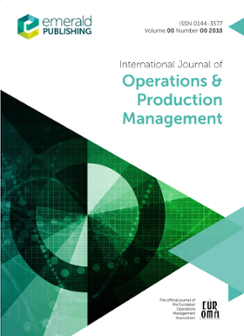Realizing operational and innovation benefits in buyer–supplier relationships: the role of close ties to the partner's partners
IF 7.4
2区 管理学
Q1 MANAGEMENT
International Journal of Operations & Production Management
Pub Date : 2023-09-13
DOI:10.1108/ijopm-01-2023-0030
引用次数: 0
Abstract
Purpose As buyers and suppliers seek to create value, they face the challenge of creating an environment that promotes coordination and information sharing and discourages opportunism. While the literature suggested dyadic mechanisms to create such an environment, this study focuses on ties beyond the buyer–supplier dyad. Specifically, close connections to one's partner's partners (CPP) are crucial in the realization of benefits for buyers and suppliers. Design/methodology/approach Drawing from embeddedness theory and governance theory, the authors developed a contingency framework to examine when CPP are beneficial or counterproductive considering two dyadic attributes – relational capital (RC) and partner dependence. Analyses were conducted using data from a dyadic survey complemented with archival data on 106 buyer–supplier relationships (BSRs). Findings The study reveals that CPP both help and hurt in the realization of benefits. Stark asymmetries exist between the impact of CPP on the buyer and supplier sides. For buyers, CPP exert a direct positive effect on operational and innovation benefits. For suppliers, the effect of CPP on operational and innovation benefits is contingent on buyer dependence and RC – CPP serves as a substitute for buyer dependence and RC. There are no such contingency effects for buyers. Further analysis identifies situations for suppliers when CPP hurt the realization of benefits. Originality/value The study highlights the importance of CPP to foster efficiency and innovation within BSRs and illustrates how their impact varies across contingency conditions and across the parties within a dyad.在买方-供应商关系中实现运营和创新利益:与合作伙伴的合作伙伴紧密联系的角色
当买家和供应商寻求创造价值时,他们面临着创造一个促进协调和信息共享并阻止机会主义的环境的挑战。虽然文献表明二元机制可以创造这样的环境,但本研究关注的是超越买方-供应商二元关系的关系。具体来说,与合作伙伴的合作伙伴(CPP)的密切联系对于买家和供应商的利益实现至关重要。借鉴嵌入性理论和治理理论,作者开发了一个权变框架,考虑到两个二元属性——关系资本(RC)和伙伴依赖,研究CPP何时是有益的还是适得其反的。分析使用的数据来自一个二元调查补充档案数据106买方-供应商关系(BSRs)。研究结果表明,CPP对利益的实现既有帮助,也有伤害。CPP对买方和供应商的影响之间存在明显的不对称。对于购买者而言,CPP对经营效益和创新效益有直接的正向影响。对于供应商而言,CPP对经营效益和创新效益的影响取决于买方依赖,而RC - CPP可以替代买方依赖和RC。对于买家来说,没有这种偶然性效应。进一步的分析确定了供应商在CPP损害利益实现的情况。该研究强调了CPP对促进bsr内部效率和创新的重要性,并说明了它们的影响如何在偶然性条件下和两分制内各方之间变化。
本文章由计算机程序翻译,如有差异,请以英文原文为准。
求助全文
约1分钟内获得全文
求助全文
来源期刊
CiteScore
13.30
自引率
17.20%
发文量
96
期刊介绍:
The mission of the International Journal of Operations & Production Management (IJOPM) is to publish cutting-edge, innovative research with the potential to significantly advance the field of Operations and Supply Chain Management, both in theory and practice. Drawing on experiences from manufacturing and service sectors, in both private and public contexts, the journal has earned widespread respect in this complex and increasingly vital area of business management.
Methodologically, IJOPM encompasses a broad spectrum of empirically-based inquiry using suitable research frameworks, as long as they offer generic insights of substantial value to operations and supply chain management. While the journal does not categorically exclude specific empirical methodologies, it does not accept purely mathematical modeling pieces. Regardless of the chosen mode of inquiry or methods employed, the key criteria are appropriateness of methodology, clarity in the study's execution, and rigor in the application of methods. It's important to note that any contribution should explicitly contribute to theory. The journal actively encourages the use of mixed methods where appropriate and valuable for generating research insights.

 求助内容:
求助内容: 应助结果提醒方式:
应助结果提醒方式:


